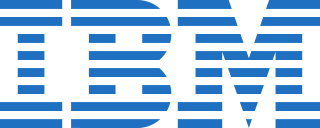Related Research Articles

AIX is a series of proprietary Unix operating systems developed and sold by IBM for several of its computer platforms.
IBM mainframes are large computer systems produced by IBM since 1952. During the 1960s and 1970s, IBM dominated the computer market with the 7000 series and the later System/360, followed by the System/370. Current mainframe computers in IBM's line of business computers are developments of the basic design of the System/360.

VSEn is an operating system for IBM mainframe computers, the latest one in the DOS/360 lineage, which originated in 1965. It is less common than z/OS and is mostly used on smaller machines.
This article presents a timeline of events in the history of computer operating systems from 1951 to the current day. For a narrative explaining the overall developments, see the History of operating systems.

Coherent is a clone of the Unix operating system for IBM PC compatibles and other microcomputers, developed and sold by the now-defunct Mark Williams Company (MWC). Historically, the operating system was a proprietary product, but it became open source in 2015, released under the BSD-3-Clause license.
Disk Operating System/360, also DOS/360, or simply DOS, is the discontinued first member of a sequence of operating systems for IBM System/360, System/370 and later mainframes. It was announced by IBM on the last day of 1964, and it was first delivered in June 1966. In its time, DOS/360 was the most widely used operating system in the world.

The IBM 3790 Communications System was one of the first distributed computing platforms. The 3790 was developed by IBM's Data Processing Division (DPD) and announced in 1974. It preceded the IBM 8100, announced in 1979.

Nixdorf Computer AG was a West German computer company founded by Heinz Nixdorf in 1952. Headquartered in Paderborn, Germany, it became the fourth largest computer company in Europe, and a worldwide specialist in banking and point-of-sale systems.

Applied Data Research, Inc. (ADR), was a large software vendor from the 1960s until the mid-1980s. ADR is often described as "the first independent software vendor".
Datacom/DB is a relational database management system for mainframe computers. It was developed in the early 1970s by Computer Information Management Company and was subsequently owned by Insyte, Applied Data Research, Ameritech, and Computer Associates International, Inc. Datacom was acquired by CA Technologies, which renamed it to CA-Datacom/DB and later to CA Datacom/DB. In 2018, Broadcom acquired CA Technologies which included the CA Datacom product family. In 2021, Broadcom has dropped the CA and now refers to the product family as Datacom or Datacom/DB.
Locus Computing Corporation was formed in 1982 by Gerald J. Popek, Charles S. Kline and Gregory I. Thiel to commercialize the technologies developed for the LOCUS distributed operating system at UCLA. Locus was notable for commercializing single-system image software and producing the Merge package which allowed the use of DOS and Windows 3.1 software on Unix systems.
DUCS was a teleprocessing monitor from CFS Inc. It was one of two early local teleprocessing packages for IBM's DOS/VSE environment. DUCS provided an interface and access method for programmers to 'talk' to monitors. Such access methods later became known as APIs.
Westi was one of two early local teleprocessing packages for IBM's DOS/VSE environment. Westi stood for Westinghouse Terminal Interactive. Westi provided an interface and access method for programmers to 'talk' to monitors and handle data entry. Such access methods later became known as APIs and the handlers a form of transaction processing.
DOCS was a software package for IBM mainframes by CFS Inc., enabling access to the system console using 3270-compatible terminals.
Westinghouse Disk Utility, popularly called WDU, is a copy/backup/restore program for IBM's DOS, DOS/VS, and DOS/VSE environments. In 1978, it was reported that WDU, a product of Westinghouse Electric Corporation, was in use at over 3,000 sites.

GRASP was a systems software package that provided spooling facilities for the IBM/370 running DOS/VS or DOS/VSE environment, and IBM/360 running DOS or retrofitted with modified DOS.
Easytrieve is a report generator, sold by CA Technologies. Easytrieve Classic and Easytrieve Plus are two available versions of this programming language primarily designed to generate reports and are used by large corporations operating in mainframe, UNIX, Linux, and Microsoft Windows environments.

Altos Computer Systems was founded in 1977 by David G. Jackson and Roger William Vass Sr. It focused on small multi-user computers, starting with multi-user derivatives of CP/M, and later including Unix and Xenix-based machines. In its 1982 initial public offering on NASDAQ, the company raised $59M. Thereafter the company's stock was traded under the symbol ALTO.
Computer Associates Panvalet is a revision control and source code management system originally developed by Pansophic Systems for mainframe computers such as the IBM System z and IBM System/370 running the z/OS and z/VSE operating systems.
References
- 1 2 3 4 Leavitt, Don (16 May 1977), "'Edos/VS' marks first response to IBM Release 34", ComputerWorld, vol. 11, no. 20, IDG Enterprise, pp. 1, 4, ISSN 0010-4841
- ↑ Leavitt, Don (3 July 1978), "Move to Edos/VS generally goes well", Computerworld, vol. 12, no. 27, IDG Enterprise, p. 15, ISSN 0010-4841
- ↑ "Nixdorf plans operating system for IBM 4300", Computerworld, vol. 15, no. 8, IDG Enterprise, p. 13, February 1981, ISSN 0010-4841
- ↑ article
- ↑ "'Econ' puts console work for DOS, DOS/VS on CRT", Computerworld, vol. 13, no. 49, p. 42, 3 December 1979, ISSN 0010-4841
- ↑ Rosenberg, Marcy (8 September 1980), "Nixdorf Launches Software Offerings", Computerworld, vol. 14, no. 36, IDG Enterprise, p. 47, ISSN 0010-4841
- ↑ Emmett, Ralph (February 1982). "Soft Key to IBM's Kingdom?" (PDF). Datamation: 71–74.
- ↑ Blumenthal, Marcia (18 August 1980), "ADR asks ruling on Datacom rights", Computerworld, vol. 14, no. 33, IDG Enterprise, p. 76, ISSN 0010-4841
- ↑ "ADR, Nixdorf Companies Settle Marketing Dispute", Computerworld, vol. 15, no. 16, p. 78, 20 April 1981, ISSN 0010-4841
- ↑ "Nixdorf announces series of software". Computerworld. 19 (29). IDG Enterprise: 42. 1985-07-22.
- ↑ "Edos RJE option will integrate terminal support under spooling", Computerworld, vol. 7, no. 44, IDG Enterprise, p. 12, 31 October 1973, ISSN 0010-4841
- ↑ "TMS Controls Tapes Under Edos", Computerworld, vol. 9, no. 28, IDG Enterprise, p. 11, 9 July 1975, ISSN 0010-4841
- ↑ "Nixdorf unwraps Unix-compatible T/S for IBM", Computerworld, vol. 27, no. 37, IDG Enterprise, p. 4, 12 September 1983, ISSN 0010-4841
- ↑ "NIXDORF LEAVES SOME 8890 IBMULATOR USERS FEELING LIKE ORPHANS". Tech Monitor. 1989-10-22. Retrieved 2023-01-06.
- ↑ "NIXDORF PHASES OUT IBM 370-COMPATIBLES FOR UNIX". Tech Monitor. 1989-03-13. Retrieved 2023-01-06.